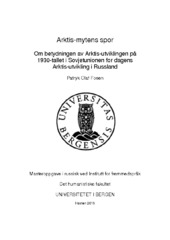| dc.description.abstract | Russland er et nordlig land som både omringer, og omringes av, omtrent halve Arktis. På 1930- tallet under Stalin ble det russiske Arktis forsøkt temmet av sovjeterne gjennom spektakulære arktiske ekspedisjoner hvis formål var å få brakt naturressursene i det kalde nord inn under sovjetmyndighetenes rådighet. De sovjetiske figurene som deltok i disse ekspedisjonene, de første Heltene av Sovjetunionen, var uhyre viktige for Stalins propagandamaskineri og sovjetisk nasjonsbygging i sin samtid. De teknologiske fremskrittene som de sovjetiske Arktis-ekspedisjonene var avhengig av for å lykkes ble sammen med ekspedisjons-suksessene presentert i den sovjetiske offentlighet som bevis for Sovjetunionens storhet og fremskritt. At livsvilkårene i det russiske Arktis var vanskelige, ble på lik linje med GULag-ene unntatt offentligheten. Resultatet var en ensidig, positiv, overdreven fremstilling av virkeligheten, kjent som Arktis-myten. Denne masteroppgaven retter blikket mot dagens russiske Arktis-utvikling i lys av 1930-tallet, hvor Arktis-myten spilte en hovedrolle. Gjennom intervjuer og ekspedisjonsrapporter fokuseres det på følgende nøkkelmomenter i den moderne Arktis-utviklingen: Arktika-2007, en ekspedisjon kjent for plantingen av det russiske flagget på bunnen av Nordpolen, den nyopprettede Nordområdekommisjonen i 2015 og visestatsminister Dmitrij Rogozins Svalbard- besøk i 2015. Det oppdages at den sovjetiske Arktis-historien og Arktis-myten påvirker holdningene til dagens russiske arktiske ledere, i tillegg til den den moderne utviklingen generelt. | en_US |
| dc.description.abstract | Russia is a northern country both encircling and being encircled by half of the Arctic. This has led to great Russian undertakings in conquering the North, especially during the high-Stalinist period of the 1930s. The golden promise of richness and wealth, as well as a perceived foreign threat and competition in the Arctic, were among the key motives of such action, which had its clear successes that were widely propagated by the Bolshevik regime to prove the superiority of Marxism-Leninism to the Soviet population and the world. The harsh realities of Arctic life and the not always exemplary conduct showed by Soviets there, in addition to the GULag-system of labour camps, were on the other hand kept out of the Soviet public sight. The unilateral Arctic-based culture created at the time is referred to as the Arctic Myth. During the Great Patriotic War, the scientific research and economical development of the 1930s had to be put on hold for some time. The Arctic did however become part of the war theater due to the fighting between the Red Army and the Wehrmacht in the Murmansk-area, ending with the Soviet liberation of Finnmark. After the war, the Soviets returned to develop the Arctic, seeking to encircle and consolidate their control of it through the next decades. As a result of the economic crisis of the 1990s, following the breakup of the Soviet Union, the Russian Arctic endevours had to be put on hold once again. Today, with the Arctic being at the headlines in the media and government agendas worlwide, the Russians seek to return to their former glory in the Arctic. The question and topic of this Master thesis is the influence of the 1930s «golden age» and its Arctic Myth on the modern development of the Russian Arctic. The modern development within the framework of this thesis begins with the Arktika-2007 expedition, then continues with the creation of a new Russian Arctic State Commission in 2015 and the following trip of Russian Deputy Prime Minister Dmitri Rogozin to Svalbard and the North Pole, and ends in early 2016. The aim is to better understand the at times seemingly provocative modern Russian development of the Arctic in light of the Arctic Myth. In the analysed material, many of the characteristics and different meanings of the Arctic Myth appear, and are shown to influence attitudes held by key Russian Arctic leaders in regard to the question of the development of the Arctic today. Three Russian Arctic explorers have been interviewed, and although the opinions appearing in the material sometimes differ, there are aspects that all are in clear agreement about. It turns out that Soviet Arctic history influences the modern Russian undertakings to a perhaps underestimated extent, just as the modern Russian development of the Arctic, far more meager than perceived by the author initially, might be slightly overstated. | en_US |
